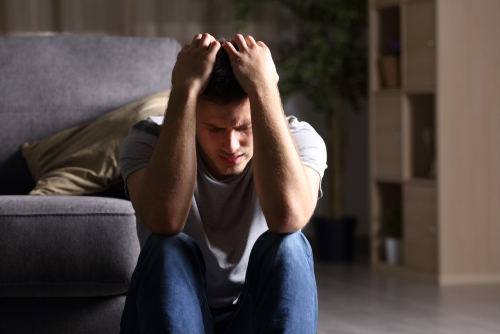How Long Does a Psychotic Episode Last?

It does need to be emphasized that neither distortions nor psychotic episodes themselves fall into one narrow descriptive category. Before exploring the question, How long does a psychotic episode last?, it’s necessary to look at what a psychotic episode actually involves.
WHAT IS A PSYCHOTIC EPISODE?
Someone experiencing a psychotic episode will lose contact with reality and begin to perceive things that don’t exist. Well-known symptoms include:
- Visual, audio or olfactory hallucinations
- Delusions: firmly believing something that’s refuted by all objective evidence (“I’m being stalked by extraterrestrials, I’ve swallowed a horse, that movie contains coded messages for me, I can levitate off the ground anytime I want to”)
- Verbal babbling
- Talking to people who aren’t there
- Behaving in wildly inappropriate ways (stripping off clothing in public, becoming violent for no reason)
But there are also milder symptoms that few people think of immediately upon hearing the word “psychotic”:
- Inability to connect with others or concentrate on work
- Difficulty maintaining one line of thought for more than a few minutes
- Struggling to put thoughts into words or to comprehend others’ words
- Mood swings, or distrust of others, without apparent triggers
- Depression or severe anxiety
- Insomnia
It’s even possible to experience “psychotic” symptoms apart from psychotic episodes, as in many cases of delusional (“paranoid”) disorder.
The drugs most frequently associated with psychotic episodes are marijuana, amphetamines, cocaine, LSD and other stimulants and hallucinogens. Not all episodes are due to drug use: any brain-affecting factor such as Alzheimer’s disease, traumatic brain injury or mental illness can be a cause. However, many people have addiction disorder and another mental/behavioral illness, and it’s not always possible to determine what triggers a specific episode.
From one cause or another, the National Alliance on Mental Illness estimates that around 3 percent of the U.S. population experience at least one psychotic episode in their lives. That may not sound like much, but it translates to over 100,000 cases each year. And these episodes present serious danger: a person may wander into traffic, step off a tall building, attack others or, most tragic of all, be shot by an emergency responder who misinterpreted erratic behavior as threatening.
HOW LONG DOES A PSYCHOTIC EPISODE LAST?
The question of how dangerous a psychotic episode is, is tied to the question of how long it lasts. The majority of drug-induced psychotic episodes last from a few hours to a couple of days, though there are occasional reports of one dragging on for weeks or months. As the saying goes, a lot can happen (even) in an hour: but exactly what happens frequently relates to the amount of time it has to happen in. The longer a person remains in a state of psychosis, the more time he or she has not only to get into trouble, but to experience a wide range of symptoms: an episode that seemed minor at first may escalate without warning, or someone who seemed out of control may suddenly calm down.
Since it’s near impossible to predict how long an individual episode will last, or what will happen before it’s run its course, the more important question is: How quickly should someone experiencing a psychotic episode get medical help? The answer is: immediately. Even if the episode doesn’t look too serious at first, waiting for it to “run its course” is playing a dangerous game in light of the unpredictability involved. Professional medical treatment not only minimizes risks, but can shorten the duration of an episode.
And all the above is doubly true in cases of drug-induced psychotic episodes, which may be symptoms of overdose and which are nearly always connected to addiction disorders that need professional detox and long-term treatment.
DRUG WITHDRAWAL, LONG-TERM RECOVERY AND PSYCHOTIC EPISODES
If someone is in detox treatment apart from a previous episode, hallucinations and other psychotic symptoms may also be symptoms of withdrawing from drugs. If stimulant misuse is frequently associated with psychotic episodes, so is the discontinuation of depressants, the drug-spectrum opposites of stimulants. (The notorious delirium tremens, which occur in about 5 percent of alcohol-withdrawal cases and can kill, frequently manifest symptoms such as hallucinations, panic attacks, altered mental functions and unusual stimulus sensitivity.) In such cases, the psychotic episode rarely lasts longer than the 5–10 days it takes to complete acute withdrawal.
A longer-term danger is that proneness to psychotic episodes may linger for months, even years, after the drug has physically left the body. You’ve probably heard of “acid flashbacks,” cases of spontaneous hallucinating in people who took LSD years earlier. (Medical science calls this Hallucinogen Persisting Perception Disorder.) While it’s unclear just how high the risk is that someone who regularly took LSD will have future psychotic episodes, it’s well established that addiction disorder is a chronic illness. Since it’s chronic, various symptoms may continue to surface periodically, long after the addicted person’s system is physically “clean.” Anyone who’s in recovery from addiction and has experienced psychotic episodes in the past, should be aware of symptoms to watch for and what to do in case of a new episode.
WHAT TO DO IF SOMEONE HAS A PSYCHOTIC EPISODE
If someone else shows signs of a psychotic episode (whether or not you’ve seen them take any drugs), act promptly:
- If symptoms are minor and the person cooperative, and especially if a third party is on hand to help, you may be able to take the patient to an emergency room personally. Be very careful about this option, however. If an episode suddenly escalates while the patient is in a car, and within reach of the driver, a door or any potentially dangerous object, the results could be tragic.
- If you have any doubts about being able to get the person to medical help safely, call 911 for emergency help. Be sure to ask the dispatcher to send someone trained in dealing with psychotic episodes. (You may want to specifically request medical help, rather than law enforcement.)
- While waiting for help, do what you can to reassure the person and steer them away from danger. But protect yourself as well: be alert for sudden bolting or lashing out.
- Move any dangerous objects out of reach.
- When help arrives, be prepared to provide information on any drugs taken, the person’s medical history and any other circumstances that may have triggered the episode.
- If this is a friend or family member, urge them to seek medical evaluation after the crisis is past. If they have an addiction disorder or some other mental illness, be prepared to offer your personal help and support for their treatment and recovery. Find out if there’s risk of recurrence and how to recognize or prevent future episodes.
- If addiction disorder has caused past problems in your relationship, and the person experiences another psychotic episode after entering recovery, your first impulse may be to accuse them of relapsing into drug use. Don’t. As already noted, psychotic episodes can occur due to other causes, including delayed aftereffects of previous drug use. If your loved one is innocent and you lash into them without even listening, resulting hard feelings will both hurt the relationship and increase the risk of actual relapse.
- If a subsequent episode does prove to be due to relapse, respond with the same encouragement and understanding you’d show for a relapse with any other cause. Relapses are little different from recurrence of any other chronic-illness symptom: they signal a treatable setback, not permanent failure.
IN CONCLUSION
Many people have an additional question: Can psychotic episodes be prevented? They can’t always: there are many things about psychosis that even medical science isn’t certain about. However, doing everything possible to care for physical and mental health—including staying sober—will do much to swing the odds in your favor. If you have had a psychotic episode or think you might be vulnerable to one:
- Get professional treatment for addiction disorder and any other illnesses you have.
- Do everything you can to minimize stress in your life. Especially, avoiding filling your schedule too full or taking on unnecessary responsibility.
- Learn to reduce the pain of the unexpected by leaving room for course corrections and by practicing prayer, meditation or mindfulness exercises.
- Have long-term goals, pursue your passions, and believe in yourself.
- Eat healthy: lots of protein and fiber, not too long between meals, not too much at one sitting. And know any foods you have bad reactions to.
- Get daily exercise, even if this only means squeezing in some extra walking by parking at the far end of the lot.
- Try to get at least eight hours of sleep each night. And practice quality as well as quantity in your sleep: keep your bedroom dark and comfortable, and establish an evening winding-down routine.
Knowing how long a psychotic episode might last is interesting and sometimes important information. Even more important, though, is getting more years in your life and more life in your years!
SOURCES:
- Byrne, Peter (2007, March 31). “Managing the Acute Psychotic Episode.” theBMJ, Vol. 334, No. 7595, pp. 686–692. Retrieved from https://www.ncbi.nlm.nih.gov/pmc/articles/PMC1839209/
- Cleveland Clinic. “Delusional Disorder.” Retrieved from https://my.clevelandclinic.org/health/diseases/9599-delusional-disorder
- Dugdale, David C. (2019, January 10). “Delirium Tremens.” National Institutes of Health, U.S. National Library of Medicine, MedlinePlus. Retrieved from https://medlineplus.gov/ency/article/000766.htm
- Ferro, Shaunacy (2013, September 23). “Are Acid Flashbacks a Myth?” Popular Science. Retrieved from https://www.popsci.com/science/article/2013-08/fyi-can-acid-trip-really-give-you-flashbacks
- Graham, Karen (2018, March 1). “What to Do if a Family Member or Friend Has Psychotic Symptoms.” University of North Carolina Health System, Health Talk. Retrieved from https://healthtalk.unchealthcare.org/what-to-do-if-a-family-member-or-friend-has-psychotic-symptoms/
- Holley, Peter, and Wesley Lowery (2015, December 31). “Why Police Calls Involving the Mentally Ill Often End in Tragedy.” Chicago Tribune. Retrieved from https://www.chicagotribune.com/news/local/breaking/ct-quintonio-legrier-police-shooting-20151231-story.html
- MacGill, Markus (2017, December 14). “What Is Psychosis?” MedicalNewsToday.com. Retrieved from https://www.medicalnewstoday.com/articles/248159.php
- National Alliance on Mental Illness. “Early Psychosis and Psychosis.” Retrieved from https://www.nami.org/earlypsychosis
- National Alliance on Mental Illness (2016). “What Is Early and First-Episode Psychosis?” Retrieved from https://www.nami.org/NAMI/media/NAMI-Media/Images/FactSheets/What-is-Early-and-First-Episode-Psychosis.pdf
- National Institute of Mental Health. “What Is Psychosis? Retrieved from https://www.nimh.nih.gov/health/topics/schizophrenia/raise/what-is-psychosis.shtml
- Pelic, Christopher, and Hugh Myrick (2003, January). “Who’s at Greatest Risk for Delirium Tremens.” Current Psychiatry, Vol. 2, No. 1, pp. 14–19. Retrieved from https://www.mdedge.com/psychiatry/article/66149/schizophrenia-other-psychotic-disorders/whos-greatest-risk-delirium-tremens
- Szalavitz, Maia (2013, March 18). “What Really Causes Violence in Psychosis?” TIME. Retrieved from http://healthland.time.com/2013/03/18/what-really-causes-violence-in-psychosis/
- Tanap, Ryann (2017, March 20). “Understanding Psychotic Breaks.” National Alliance on Mental Illness. Retrieved from https://www.nami.org/Blogs/NAMI-Blog/March-2017/Understanding-Psychotic-Breaks
For additional information on mind-altering drugs, see the following articles:
Alcohol Withdrawal Hallucinations

